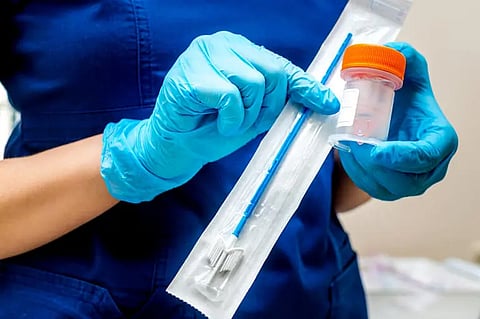

Women in England who have repeatedly missed cervical screening appointments will soon have the option to perform self-tests at home — a significant step aimed at improving participation rates and reducing cervical cancer cases.
The new self-administered kits are designed to detect the human papillomavirus (HPV), the leading cause of cervical cancer. The initiative addresses common reasons women cite for avoiding traditional NHS screenings — including lack of time, discomfort, and embarrassment — by offering a more private and convenient alternative.
Following approval by the UK National Screening Committee in March, NHS England plans to launch the at-home testing programme early next year, initially targeting specific groups of women who have rarely or never attended regular screenings. Currently, cervical screening is offered every three years to women aged 25 to 64.
Officials hope that expanding access to at-home testing will encourage greater participation in cervical screening, leading to earlier diagnosis and significantly lowering the risk of cervical cancer progression.
Under the new plan, self-sampling kits will be mailed to eligible women, who can collect their own sample and return it via prepaid mail. Women who test positive for HPV will be referred for in-person follow-up appointments with healthcare professionals for further evaluation.
The programme builds on research from the YouScreen trial, led by King’s College London in collaboration with NHS England. The study demonstrated that offering self-sampling kits, either during GP visits or via post, could potentially increase screening uptake by around 400,000 additional women each year.
According to the Department of Health and Social Care, this expanded approach has the potential to save up to 5,000 lives annually by targeting groups historically underrepresented in cervical screening — including younger women, ethnic minorities, individuals with disabilities, and members of the LGBT+ community.
“This is healthcare that works around people’s lives,” said Health and Social Care Secretary Wes Streeting. “It puts women firmly in control of their own health and helps us detect cancers at their earliest, most treatable stages. Our 10-year health plan is designed to shift focus from treating illness to preventing it before it starts.”
Dr Anita Lim, chief investigator of the YouScreen trial, called the move “a significant step forward for cervical cancer prevention” and a key milestone toward the NHS’s goal of eliminating cervical cancer by 2040. “Self-sampling helps reach people who struggle to attend traditional screenings, particularly in diverse and underserved communities,” she said.
Michelle Kane, NHS England’s director of screening, added: “We know there are many reasons some women delay or avoid screening. By offering self-testing, we hope to remove some of these barriers and encourage more women to take advantage of this potentially life-saving service.”
She urged anyone invited for cervical screening — whether through a GP practice or via the NHS App — to participate and seek medical attention for any concerning symptoms promptly, as early detection greatly improves outcomes.